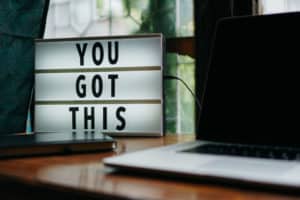Sweaty palms, heart racing, and the dread of saying the wrong thing – we’ve all been there, staring into the abyss of a job interview. In this blog post, you’ll snag some game-changing techniques to turn that interview anxiety into your secret weapon.
Quick Takeaways:
- Practice the 4-7-8 breathing method to calm interview nerves and focus on the present moment.
- Use power poses and positive visualization to boost confidence and reduce stress hormones before the interview.
- Reflect post-interview to identify strengths and areas for improvement, enhancing performance over time.
What Can You Do the Night Before to Prepare?
The night before a job interview can understandably feel like the calm before the storm. It’s a critical time when relaxation and review should be your top priorities to ensure you’re in the best shape mentally, physically, and emotionally for the big day. Here’s how you can nail this preparation phase:
Gather your materials : This means printing extra copies of your resume, planning your outfit, and ensuring any tech you might need is charged and ready. An often overlooked yet vital item is a small notepad and pen for jotting down notes.
Practice makes perfect : Run through common interview questions but resist the urge to memorize your answers. Instead, focus on key points you’d like to mention. Websites like Glassdoor offer insight into company-specific interview questions that can give you an edge.
Guarantee yourself a good night’s sleep : This might sound obvious, but it’s often easier said than done. Try winding down with a book instead of your phone screen and consider a brief meditation session to calm the mind. Apps like Headspace offer guided meditations specifically designed to promote restful sleep.
How Can Breathing Techniques Help You Stay Calm?
When you feel anxiety creeping up, remember, your breath is a powerful tool to regain control and composure. Simple breathing exercises can significantly lower stress levels before and during your interview. Here’s a quick technique to try:
- The 4-7-8 Method: This involves breathing in for four seconds, holding your breath for seven seconds, and then exhaling slowly for eight seconds. It’s a method that you can do anywhere – be it the waiting room or the restroom before your interview starts. This exercise helps reduce anxiety and brings your focus back to the present moment.
What Are Some Confidence-Boosting Strategies?
Stepping into an interview full of confidence can sometimes be half the battle won. Here are some strategies to give you that much-needed boost:
Power Poses : This is where you stand in a pose of confidence for a few minutes, such as hands on hips or arms raised in victory. Popularized by social psychologist Amy Cuddy, this technique can genuinely increase testosterone (confidence hormone) levels and decrease cortisol (stress hormone) levels.
Positive Visualization : Spend some time visualizing a successful interview – from greeting the interviewer with a firm handshake to confidently answering questions and leaving the room with a smile. This mental rehearsal primes your brain to follow through when the time comes.
Unique Strategy – Desk of Triumph : Here’s something you might not have heard of. The evening before, arrange a small area on your desk or in your room with items that represent your past successes or remind you of positive moments in your professional journey. It could be an award, thank-you notes from colleagues or clients, or even a project that you’re particularly proud of. Spending a few moments with your ‘Desk of Triumph’ can serve as a tangible reminder of your capabilities and achievements, providing a solid confidence boost before your interview.
Remember, the goal of these tips isn’t just to help you survive your job interview but to thrive during it. Each strategy we’ve discussed is geared towards making you the most relaxed, prepared, and confident version of yourself. Keep practicing these techniques, and over time, you’ll find that what once seemed like an Everest-scale challenge might just feel like a walk in the park.
Talking about your nerves in a job interview is a bit like walking a tightrope. On one hand, showing vulnerability can humanize you and forge a connection with the interviewer. On the other, you don’t want them to doubt your ability to handle the role. So, let’s dissect the pros and cons and offer up some advice on how to tread this line, should you choose to share.
Pros:
– Authenticity: Admitting you’re nervous can make you appear more authentic and relatable. Everyone gets nervous—it’s human.
– Setting Expectations: If your anxiety affects your performance, mention it early to set the stage, letting the interviewer understand your context.
Cons:
– Perceived Weakness: Unfortunately, some might misconstrue your honesty for incapability or lack of confidence in your skills.
– Potential Bias: Despite progresses in workplace mental health awareness, biases sadly still exist. Disclosing anxiety might, unfoundedly, reinforce those.
Tips on How to Share Professionally:
– Timing is Everything: Don’t lead with it. Wait for the conversation to warm up a bit or for a natural moment when discussing challenges or personal growth.
– Spin It Positively: Frame your anxiety in the context of how it’s honed your preparation skills or made you more empathetic towards others under stress.
– Keep it Brief: Don’t dwell. Share, acknowledge, and pivot back to your strengths and what you bring to the table.
How Can You Turn Anxiety into Your Advantage?
Believe it or not, those butterflies aren’t just there to make your stomach churn—they can actually be your allies. Transitioning from viewing anxiety as a stumbling block to recognizing it as fuel can change the game.
Jazz Up Your Storytelling: Passion often comes with nerves. Let your enthusiasm for the job show by weaving your answers with stories that demonstrate not just your skills, but your drive. For example, instead of just stating you led a project, dive into the emotions and stakes involved, how you navigated challenges with your team, and how it made you feel to see it succeed.
Channel Your Nervous Energy: Use the adrenaline to stay alert and engaged. Channel it into positive behaviors like maintaining good posture, speaking clearly, and exhibiting an engaging level of enthusiasm. Imagine transforming that nervous energy into a dynamic force that propels your performance.
Preparation is Key: Interestingly, the process of over-preparing, which many anxious job-seekers naturally gravitate towards, can be a superpower. It means you’re likely to have thoughtful answers at the ready and insightful questions to ask. It showcases not only your dedication but can also ease your nerves, knowing you’ve done everything possible to ready yourself.
What Role Does Post-Interview Reflection Play?
Reflecting on your interview experience is indispensable. It allows you to grow, improve, and approach each interview with more confidence. Instead of dwelling on what went wrong, focus on actionable insights. Here’s how to make reflection constructive:
- Immediate Memory Recap: As soon as possible post-interview, jot down key points. What questions stumped you? Where did you shine? Immediate impressions will help you prepare for next time.
- Identify Patterns: Over time, review your notes from various interviews. Are there recurring areas where you feel less confident? This insight can guide your preparation focus.
- Seek Feedback: If possible, follow up with your interviewer for feedback. Frame it as your continuous improvement effort; most people respect that and are willing to offer insights.
- Set Goals for Improvement: Based on your reflections, set specific, actionable goals. For example, if explaining your project management method was challenging, maybe it’s time to refine your elevator pitch or gather more concrete results to share.
- Practice Self-Compassion: It’s easy to be your own worst critic. Remember to acknowledge your growth and courage in facing what makes you anxious.
Unique Tip : Create a ‘confidence log’ where you note down moments you handled well in each interview—questions that were a hit, situations you navigated smoothly, compliments from the interviewer, etc. Reviewing this before your next interview can be an incredible boost to your self-esteem and a powerful reminder that you’re improving, learning, and becoming more adept at handling interview stress with each attempt.
By embracing your anxiety, sharing it judiciously (if at all), and using post-interview reflection as a growth tool, you’ll not only manage your nerves but also stand out as a thoughtful, prepared, and resilient candidate. Remember, every interviewer appreciates authenticity, readiness, and the ability to learn and grow—traits that your journey with anxiety uniquely equips you to demonstrate.







